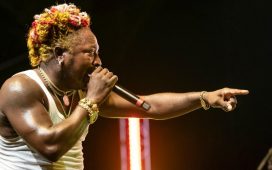A lot has changed since March, when the Royal Opera House closed in the middle of a starry run of Beethoven’s Fidelio. Caught somewhere between topicality and opportunism, New Dark Age is a confused diptych that ticks all the boxes without doing much else – less the start of a new conversation than an apologetic aside.
Women, historically all but absent from the company’s roster of composers, conductors and even directors, were suddenly everywhere. Only two women have had operas performed on the main stage since 1732; in one evening we heard four more – one of whom, Hannah Kendall, was also the first composer of colour. Progress, yes. But this hastily assembled grab-bag of material wasn’t commissioned or conceived as a whole, wasn’t planned or made for the space. This was a one-off, a space-filler, a gesture.
Originally premiered in 2016, Kendall’s chamber opera The Knife of Dawn is a meditation on colonial responsibility, art and politics. Guiana’s poet-turned-political-leader Martin Carter echoes Beethoven’s Florestan as he broods in the prison cell where he is unjustly held, hearing voices in his head as he wrestles with a hunger strike.
The i newsletter latest news and analysis
The forces are lean – a single onstage baritone (Peter Brathwaite) is supplemented by three offstage female voices, harp, violin, viola and cello. The sonorities are striking – a broken halo of upper strings and voices glinting around that baritone anchor – and textures spare, telling. But the work gains little from this enormous space, lost sonically and visually, failing to sustain dramatic thrust over the whole hour.
Cobbled together from pre-existing music by Anna Meredith, Missy Mazzoli and Anna Thorvaldsdottir, and directed by Katie Mitchell, New Dark Age is also strangely undramatic. Three women (Nadine Benjamin, Susan Bickley, Anna Dennis) sing motionless on stage while their video avatars (filmed by Grant Gee) leave their homes and walk across London in meaningful slow-mo. Masks, empty streets and stations stress isolation, while pixelated effects point to the de-humanising of digital existence, but it’s all a bit flimsy, a bit obvious.
The singing, especially from soprano Anna Dennis, is radiant, and under Natalie Murray Beale the orchestra create a kaleidoscope of acoustic and electronic colours, but there’s not enough grit to balance out affirmative arpeggios and riffs. The music grows to a climax in a lovely Thorvaldsdottir hymn. But for what, or to whom, we are praying remains unclear.














